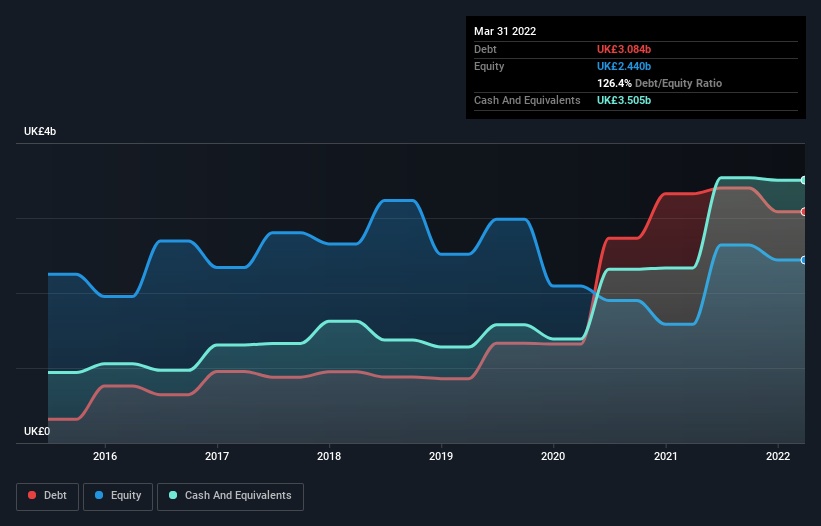David Iben put it well when he said, 'Volatility is not a risk we care about. What we care about is avoiding the permanent loss of capital.' So it seems the smart money knows that debt - which is usually involved in bankruptcies - is a very important factor, when you assess how risky a company is. We note that easyJet plc (LON:EZJ) does have debt on its balance sheet. But the real question is whether this debt is making the company risky.
When Is Debt Dangerous?
Debt assists a business until the business has trouble paying it off, either with new capital or with free cash flow. In the worst case scenario, a company can go bankrupt if it cannot pay its creditors. While that is not too common, we often do see indebted companies permanently diluting shareholders because lenders force them to raise capital at a distressed price. Having said that, the most common situation is where a company manages its debt reasonably well - and to its own advantage. When we think about a company's use of debt, we first look at cash and debt together.
View our latest analysis for easyJet
How Much Debt Does easyJet Carry?
As you can see below, easyJet had UK£3.08b of debt at March 2022, down from UK£3.32b a year prior. However, it does have UK£3.51b in cash offsetting this, leading to net cash of UK£421.0m.

How Healthy Is easyJet's Balance Sheet?
The latest balance sheet data shows that easyJet had liabilities of UK£3.99b due within a year, and liabilities of UK£3.91b falling due after that. Offsetting these obligations, it had cash of UK£3.51b as well as receivables valued at UK£336.0m due within 12 months. So its liabilities total UK£4.05b more than the combination of its cash and short-term receivables.
Given this deficit is actually higher than the company's market capitalization of UK£3.76b, we think shareholders really should watch easyJet's debt levels, like a parent watching their child ride a bike for the first time. In the scenario where the company had to clean up its balance sheet quickly, it seems likely shareholders would suffer extensive dilution. Given that easyJet has more cash than debt, we're pretty confident it can handle its debt, despite the fact that it has a lot of liabilities in total. When analysing debt levels, the balance sheet is the obvious place to start. But it is future earnings, more than anything, that will determine easyJet's ability to maintain a healthy balance sheet going forward. So if you're focused on the future you can check out this free report showing analyst profit forecasts.
Over 12 months, easyJet reported revenue of UK£2.7b, which is a gain of 213%, although it did not report any earnings before interest and tax. That's virtually the hole-in-one of revenue growth!
So How Risky Is easyJet?
While easyJet lost money on an earnings before interest and tax (EBIT) level, it actually generated positive free cash flow UK£279m. So although it is loss-making, it doesn't seem to have too much near-term balance sheet risk, keeping in mind the net cash. One positive was the revenue growth of 213% over the last year. But the stock still looks risky to us. There's no doubt that we learn most about debt from the balance sheet. However, not all investment risk resides within the balance sheet - far from it. For example, we've discovered 1 warning sign for easyJet that you should be aware of before investing here.
If, after all that, you're more interested in a fast growing company with a rock-solid balance sheet, then check out our list of net cash growth stocks without delay.
New: Manage All Your Stock Portfolios in One Place
We've created the ultimate portfolio companion for stock investors, and it's free.
• Connect an unlimited number of Portfolios and see your total in one currency
• Be alerted to new Warning Signs or Risks via email or mobile
• Track the Fair Value of your stocks
Have feedback on this article? Concerned about the content? Get in touch with us directly. Alternatively, email editorial-team (at) simplywallst.com.
This article by Simply Wall St is general in nature. We provide commentary based on historical data and analyst forecasts only using an unbiased methodology and our articles are not intended to be financial advice. It does not constitute a recommendation to buy or sell any stock, and does not take account of your objectives, or your financial situation. We aim to bring you long-term focused analysis driven by fundamental data. Note that our analysis may not factor in the latest price-sensitive company announcements or qualitative material. Simply Wall St has no position in any stocks mentioned.
About LSE:EZJ
Adequate balance sheet with acceptable track record.
Similar Companies
Market Insights
Community Narratives



